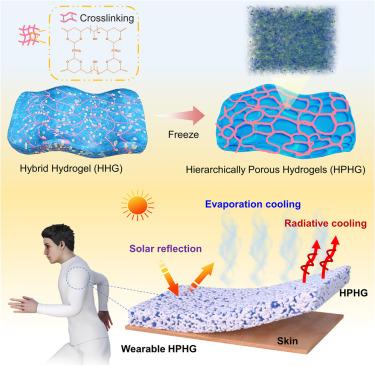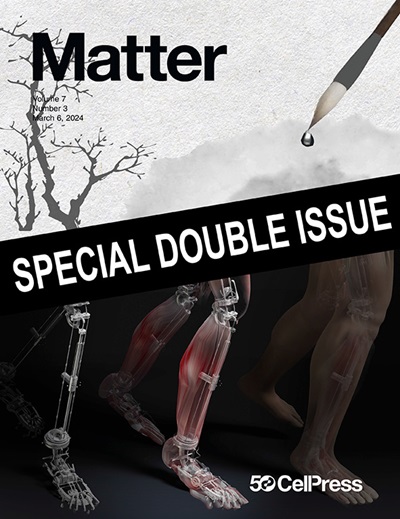Lightweight and hierarchically porous hydrogels for wearable passive cooling under extreme heat stress
IF 17.3
1区 材料科学
Q1 MATERIALS SCIENCE, MULTIDISCIPLINARY
引用次数: 0
Abstract
Increasing extreme heat stress puts humans at risk of heat stroke and dehydration in outdoor environments. However, current personal thermal management (PTM) approaches in hot summers suffer from low cooling efficiency. Here, we designed a lightweight, hierarchically porous hydrogel (HPHG) with low density, robust breaking strength, high evaporation enthalpy, high solar reflectance, and infrared emissivity, and controlled evaporation speed. The HPHG shows strong and prolonged passive cooling: sub-ambient temperature cooling up to 22.5°C under direct sunlight and a prolonged cooling time of >15 h. The HPHG can also be fabricated into a lightweight cooling vest (<350 g), achieving an average temperature drop of 11°C compared to air temperature. The concept of HPHG proposed in this study opens an avenue for hydrogel as a lightweight and wearable material in PTM and solves the bottleneck problem of passive cooling under extreme heat stress in an outdoor environment.


用于极端热应力下可穿戴式被动冷却的轻质分层多孔水凝胶
日益严重的极端热应激使人类在户外环境中面临中暑和脱水的风险。然而,目前在炎热夏季采用的个人热管理(PTM)方法存在冷却效率低的问题。在这里,我们设计了一种轻质分层多孔水凝胶(HPHG),它具有密度低、断裂强度大、蒸发焓高、太阳反射率和红外发射率高以及蒸发速度可控等特点。HPHG 显示出强大而持久的被动冷却效果:在阳光直射下,亚环境温度冷却可达 22.5°C,冷却时间长达 15 小时。HPHG 还可制成轻型冷却背心(350 克),与空气温度相比,平均温度下降 11°C。本研究提出的 HPHG 概念开辟了水凝胶作为轻质可穿戴材料用于 PTM 的途径,并解决了在户外极端热应力环境下被动降温的瓶颈问题。
本文章由计算机程序翻译,如有差异,请以英文原文为准。
求助全文
约1分钟内获得全文
求助全文
来源期刊

Matter
MATERIALS SCIENCE, MULTIDISCIPLINARY-
CiteScore
26.30
自引率
2.60%
发文量
367
期刊介绍:
Matter, a monthly journal affiliated with Cell, spans the broad field of materials science from nano to macro levels,covering fundamentals to applications. Embracing groundbreaking technologies,it includes full-length research articles,reviews, perspectives,previews, opinions, personnel stories, and general editorial content.
Matter aims to be the primary resource for researchers in academia and industry, inspiring the next generation of materials scientists.
文献相关原料
公司名称
产品信息
麦克林
PVA
阿拉丁
Glutaraldehyde
 求助内容:
求助内容: 应助结果提醒方式:
应助结果提醒方式:


